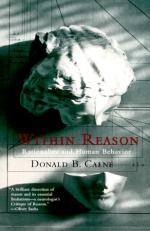|
This section contains 2,037 words (approx. 7 pages at 300 words per page) |

|
Philosophers have, at least characteristically, aspired to possess "rationality" but have not thereby sought exactly the same thing. Portrayed vaguely, rationality is reasonableness, but not all philosophers take rationality as dependent on reasons; nor do all philosophers have a common understanding of reasons or of reasonableness. Some theorists consider rationality to obtain in cases that lack countervailing reasons against what has rationality; they thus countenance rationality as, in effect, a default status. In ordinary parlance, persons can have rationality; so, too, can beliefs, desires, intentions, and actions, among other things. The rationality appropriate to action is practical, whereas that characteristic of beliefs is, in the language of some philosophers, theoretical.
Many philosophers deem rationality as instrumental, as goal oriented. You have rationality, according to some of these philosophers, in virtue of doing your best, or at least doing what you appropriately think adequate, to achieve your goals. If...
|
This section contains 2,037 words (approx. 7 pages at 300 words per page) |

|


